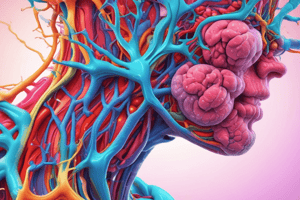Podcast
Questions and Answers
Which hormone increases cardiac activity, blood pressure, and blood glucose levels?
Which hormone increases cardiac activity, blood pressure, and blood glucose levels?
- Luteinizing hormone
- Prolactin
- Thyroxine
- Epinephrine (correct)
Which hormone stimulates the development of eggs and production of estrogen?
Which hormone stimulates the development of eggs and production of estrogen?
- Adrenocorticotropic hormone
- Melanocyte-stimulating hormone
- follicle stimulating hormone (correct)
- Thyroid-stimulating hormone
Which hormone promotes growth, protein synthesis, and lipid movement?
Which hormone promotes growth, protein synthesis, and lipid movement?
- Thyroxine
- Calcitonin
- Prolactin
- Growth hormone (correct)
Which hormone decreases calcium concentration in body fluids?
Which hormone decreases calcium concentration in body fluids?
Which organ produces thyroxine?
Which organ produces thyroxine?
Which hormone stimulates the secretion of glucocorticosteroids?
Which hormone stimulates the secretion of glucocorticosteroids?
Which hormone triggers increased melanin production in melanocytes?
Which hormone triggers increased melanin production in melanocytes?
Where is melatonin produced?
Where is melatonin produced?
Which hormone triggers smooth muscle contractions during labor and milk release?
Which hormone triggers smooth muscle contractions during labor and milk release?
What is the main target of oxytocin in females?
What is the main target of oxytocin in females?
Which hormone causes reabsorption of water and elevation of blood pressure?
Which hormone causes reabsorption of water and elevation of blood pressure?
What does insulin primarily promote the uptake of?
What does insulin primarily promote the uptake of?
Which hormone activates lipid reserves and elevates blood glucose levels?
Which hormone activates lipid reserves and elevates blood glucose levels?
What does parathyroid hormone primarily increase in body fluids?
What does parathyroid hormone primarily increase in body fluids?
Where is erythropoietin produced?
Where is erythropoietin produced?
Flashcards are hidden until you start studying
Study Notes
Hormones and Their Functions
- Epinephrine (adrenaline) increases cardiac activity, blood pressure, and blood glucose levels.
- Follicle-stimulating hormone (FSH) stimulates the development of eggs in ovaries and the production of estrogen.
- Growth hormone (GH) promotes growth, protein synthesis, and the movement of lipids.
- Calcitonin decreases calcium concentration in body fluids, helping to regulate calcium levels.
Thyroid and Adrenal Glands
- Thyroxine (T4) is produced by the thyroid gland, playing a crucial role in metabolism regulation.
- Adrenocorticotropic hormone (ACTH) stimulates the secretion of glucocorticosteroids from the adrenal cortex.
Melanin and Melatonin
- Melanocyte-stimulating hormone (MSH) triggers increased melanin production in melanocytes, influencing skin pigment.
- Melatonin is produced in the pineal gland, regulating sleep-wake cycles.
Reproductive and Labor Hormones
- Oxytocin triggers smooth muscle contractions during labor and stimulates milk release during breastfeeding.
- The main target of oxytocin in females is the uterus during labor and mammary glands for lactation.
Water and Mineral Regulation
- Antidiuretic hormone (ADH or vasopressin) causes reabsorption of water in the kidneys, elevating blood pressure.
- Insulin primarily promotes the uptake of glucose by cells, essential for energy production.
Glucose and Calcium Regulation
- Glucagon activates lipid reserves and elevates blood glucose levels between meals.
- Parathyroid hormone (PTH) primarily increases calcium concentration in body fluids, playing a vital role in calcium metabolism.
Blood Cell Production
- Erythropoietin (EPO) is produced by the kidneys and stimulates the production of red blood cells in response to low oxygen levels.
Studying That Suits You
Use AI to generate personalized quizzes and flashcards to suit your learning preferences.




